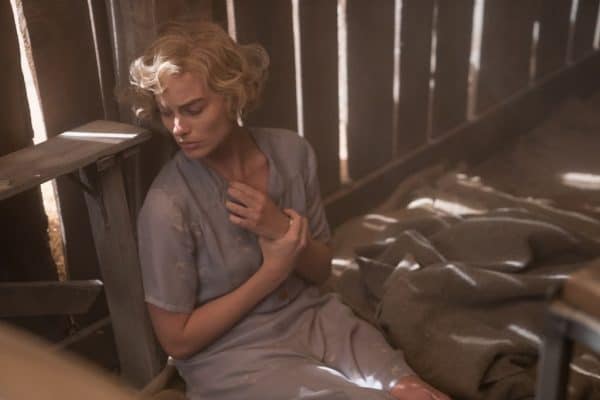Dreamland, 2020.
Directed by Miles Joris-Peyrafitte.
Starring Margot Robbie, Travis Fimmel, Finn Cole, Garrett Hedlund, Kerry Condon, Lola Kirke, Darby Camp, Hans Christopher, Jane Wilson, and Joe Berryman.
SYNOPSIS:
A teenager’s adventures as a bounty hunter takes an unexpected twist.
The story of a teenager living through an early 20th century Texas agricultural drought, saddled with fatherly abandonment baggage, stuck and destitute in a dusty boring town, and stumbling into the scenario of not only living his dream but becoming an outlaw alongside a seductive and dangerous Margot Robbie sounds like pure wish-fulfillment. However, the approach from director Miles Joris-Peyrafitte on Dreamland (working alongside screenwriter Nicolaas Zwart) has enough intelligence not to glorify the obvious Bonnie and Clyde dynamic, going against romanticism to show that the life of a bank-robbing gunslinger is not all it’s cracked up to be. And neither is running away from home (presumably underage/barely 18 – real age is never stated to my knowledge – as the boy’s lie of being 25 is seen through by her and audiences alike prompting him to be repeatedly called “boy”) to start a life of crime and sex with Margot Robbie.
Intriguingly, Dreamland is also narrated by the boy’s younger sister Phoebe (Darby Camp in the flesh and Lola Kirke undetectable with her Southern drawl as the 20 years later voiceover relaying what she believes to be the ins and outs of what really happened). At times (most notably in the beginning when the film is setting its plot up) there is an unnecessary amount of narration, but the creative choice itself allows for a mythological sheen to a fictional female outlaw. Hearing adult Phoebe talk about the legend of Allison Wells (Margot Robbie) gives off the vibe that she’s a legitimate badass, someone not to play around with or doublecross, and enough fabled mystery to drive the lingering question of whether she’s actually a murderer or if it’s all a tall tale propagated by law enforcement for whatever reason.
That’s better left uncovered for yourself, but what can be said is that Margot Robbie takes the right amount of quirkiness from her portrayal of Harley Quinn, her natural allure, and some grit fighting through a bullet wounded leg injury, concocting a character with unclear true intentions. Meanwhile, young Eugene Evans (Finn Cole), as excited as he is at the proposition of ignoring the rumors and pulling off a heist with her financially lucrative for the both of them (his family might lose their home and it’s clear he does care about Phoebe, but he desperately wants to get away and track down his real father who sent him a postcard), also becomes an object of manipulation. A point is made that Eugene is having rumbling hormonal reactions to the beauty and presence of Allison. He’s pervy and is quickly willing to take her to a hiding spot to bathe and nurse her healing leg, terribly hiding his inability to not spy on her undressing.
Eugene’s virginity and horniness is something Allison incorporates into her playbook (she needs assistance for one final job and to get across the border), with both performers demonstrating thick sexual tension through extended dialogue exchanges and multiple long takes. There’s a shower sequence that is not only lengthy but visually gets into the headspace of both characters proving this to be a well-shot film as well. If the ending proves to be somewhat predictable, Dreamland and cinematographer Lyle Vincent make up for it with a striking aerial shot for the finale. Then there’s the Bismarck setting itself with blinding dust storms and appropriate barren landscapes that are exquisitely captured.
Getting back to the point, whether Allison is a killer or lying about her innocence almost doesn’t matter (although I will assure you that you get your answer) because we are also witnessing her mold him into a criminal. The sexual attraction is just more of an element Allison plays to her advantage in escaping, sometimes pulling back and reminding Eugene she’s never going to actually romantically love him back the way he has fallen for her like a puppy dog. She’s grieving something and dealing with the circumstance in her own way while doing whatever is necessary to survive. We don’t even know if the stories surrounding her are real, just that she’s also in a bad spot, but we are rooting for them to legitimately fall for each other.
For Eugene, he’s becoming an outlaw alongside her and has a dream girl, although, Dreamland, despite the title, doesn’t treat this as a wish-fulfillment but rather a cautionary tale about the dangers of tantalizing fantasy becoming a gritty and morally corrupting reality. The third act feels rushed and most supporting characters are forgettable, but the complicated tale of criminality and low-key taboo love bound together by excellent performances makes this dream lucid.
Flickering Myth Rating – Film: ★ ★ ★ ★ / Movie: ★ ★ ★ ★
Robert Kojder is a member of the Chicago Film Critics Association and the Flickering Myth Reviews Editor. Check here for new reviews, friend me on Facebook, follow my Twitter or Letterboxd, check out my personal non-Flickering Myth affiliated Patreon, or email me at MetalGearSolid719@gmail.com















